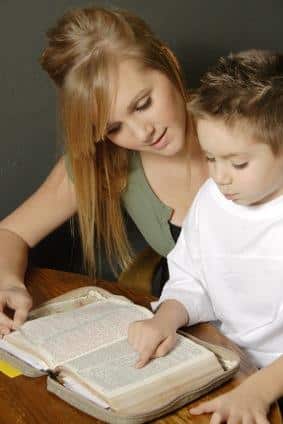 Is setting a good example for your kids and hoping they learn by following your actions enough to bring them up with manners, values, and compassion for others? Unfortunately, it may not. Actions may indeed speak louder than words, but your children are like little sponges, soaking up information from all around them. This includes information from you and your spouse, but also things they see on television, online, while with their friends, and while out in the world in general.
Is setting a good example for your kids and hoping they learn by following your actions enough to bring them up with manners, values, and compassion for others? Unfortunately, it may not. Actions may indeed speak louder than words, but your children are like little sponges, soaking up information from all around them. This includes information from you and your spouse, but also things they see on television, online, while with their friends, and while out in the world in general.
Especially if you are teaching your children at home with a faith-based perspective, character education should be a high priority in each and every day of learning. The responsibility for your children’s values lies with you and your spouse, and while showing them the way is important, so is direct instruction with examples, correcting inappropriate behaviors, studying traditional Christian values, and reading and discussing Scripture.
What Is Character Education?
Whether you have heard of this term or not, most likely character education was one of the driving forces behind your decision to homeschool your kids. Public and even private schools are breeding grounds for bad behaviors, immoral attitudes, and a plethora of experiences and ideas that you hope to keep from your kids. Ultimately, you want your children at home with you so that they will learn, grow, and develop into the kind of adults who share your values and who make positive contributions to the world. Ensuring that they do so is called character education.
What God’s Word Says About The Discipleship And Training Of The Next Generation.…
Character education can be defined very generally as learning values and aspects of development that are important to you and your family. More specifically, it may include learning good manners, religious values, civic duties, responsibility, maturity, self-discipline, or a love of learning. What goes into your specific character education plan is entirely up to you.
Outlining Goals
Because character education is a very broad subject, making sure that your kids get a good one means you need to consider it carefully and come up with goals. Think about the kind of people you want your kids to become as they grow into adults, and you have your character education goals. Write down the characteristics and values that you hope to instill in your children to make it concrete. Consult with your spouse as you do this exercise to make sure you are both on the same page. You will be constantly teaching your kids your values through your actions and everyday experiences, but when you outline the most important ones, you can emphasize them and create specific activities to target the values that are most crucial.
Here are some characteristics that you might want to consider and that will get you started thinking what is most important in your family:
- Compassion
- Integrity
- Responsibility
- Independence
- Self-reliance
- Discipline
- Hard-working
- Maturity
- Kindness
- Respect
- Honesty
- Religious values
Using Purchased Curriculum
If you can think of teaching it, someone has created a curriculum for it. Yes, there are even resources for character education. If you are looking for a Bible-based curriculum, you are in luck: there are many curricula available that are Christian in nature. You can find kits with multiple resources as well as individual items like books with stories that have teaching morals, workbooks with activities designed to illustrate certain values, videos, and even computer games. Purchasing curriculum is always an option when you are homeschooling any topic and can often make your job a little easier. Why reinvent the wheel, right?
In the case of character education, a canned curriculum might be very helpful, but you need to be especially choosy. This is all about teaching your children your values. This makes it very individualized. It is certainly possible that you can find a curriculum that matches your needs, but review it carefully before using it with your kids.
Ask around in your homeschooling network, if you have one, about what types of resources others are using. You might even be able to share and save on the cost. Also check out blogs written by dutiful homeschooling mothers. Many of them share their experiences with trying out curricula and will offer helpful reviews. Simple Homeschool has a post on character education resources. Other sites may offer discounts on certain packages. Homeschool Circus also has plenty of reviews for a variety of types of curricula.
Working Outside A Curriculum
Even if you purchase a premade curriculum for character education, there are plenty of ways for you to introduce values and character into your children’s daily lives. You can, of course, also consider scrapping the idea of a canned set of lessons and go your own way entirely when it comes to molding your kids into the kind of people you want them to be. Lessons and stories and videos are helpful, but nothing can fully replace your own heartfelt instruction. Here are some ideas to supplement what you already do to teach your children character:
- Lead by example. The most powerful method you have at your disposal for character education is your own example. Through your actions every day, you show your kids what it means to be an adult in this world. It is a huge responsibility, but remember that no one, not even your kids, expect you to be perfect all of the time. What is important, though, is that when you make a mistake, such as losing your patience with a cranky toddler, is that you explain afterwards what you did wrong and how you could have handled the situation better. You don’t want to teach your children that perfection is an attainable goal, only that they should try their best to uphold their values every day.
- Family meetings. Time spent together as a family is a crucial way to cement your values. Although you spend all day with your kids, maybe your spouse is at work during that time or your older children are working independently. Setting aside time each and every day to bring everyone together can be very powerful. You can use the time to discuss family issues, make decisions together, or pray. Consider using the time as a way to start the day off on the right foot.
- Bible time. If you are educating your kids from a Christian perspective, there is no better character education guide than the Bible. You might use your daily family meeting time to read passages together and to discuss what it tells you about how to live your life for Christ. Bible study can also be a regular part of your children’s lessons. Select passages that are most appropriate for each child based on his or her age and needs. Another good way to sneak in Bible reading and study is to read a short passage together before every meal. It can be tough to fit everything important in to each day, but if you make a little time for the Bible, your kids will be better for it.
- Story time. Character education through literature is another great way to sneak your values into the kids’ day. When you are reading stories, whether picture books with the little ones, or novels with the older kids, you can discuss values and character traits in them. With picture books, the story is typically simple and the message will be clear. Help your youngsters figure out the message and challenge them to apply it in their lives. With older children reading novels, you can have more complex discussions about the characters in the stories and how they live their lives. Be sure to read books before you give them to your kids to make sure they are appropriate and that they send the message you want them to hear.
©2013 Off the Grid News










